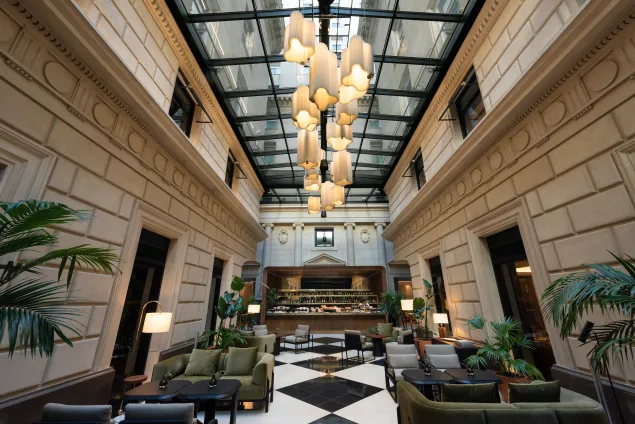One of Europe’s top luxury boutique hotel groups is expanding to Latin America. Based in Spain, Unico Hotels recently set up shop in Buenos Aires, Argentina with the opening of the new Hotel Casa Lucia.
Sign Up For Our Daily Newsletter
SIGN UP
Hosted within the historic Edificio Mihanovich—at one point in time the tallest building in Latin America—Hotel Casa Lucia is located right in the middle of the posh Calle Arroyo, in the city’s central and fashionable Recoleta neighborhood. Replacing what was previously a Sofitel-run property, Unico touts the new hotel as capturing the charm of historic Buenos Aires, while blending Argentina’s emerging design and creative talent with South American hospitality.
“It’s more modern in terms of lifestyle, a different type of five-star hotel within the city,” Victoria Espina, sales account manager at Casa Lucia, tells Observer.
And staying true to the structure’s design roots, the revamped five-star property feels like a welcome beacon for locals and international travelers alike. “Many years ago, it wasn’t a hotel, but a residence for immigrants who came from Europe,” Espina explains. “The original owner of this building wanted it to be the highest in the city so that the people who came by boat would be able to see it. It wasn’t a lighthouse, but it was like a lighthouse.”

Established during what has become known as Argentina’s early “Golden Age” during the latter half of the 19th century, Buenos Aires’ Recoleta neighborhood took on the moniker “the Paris of Argentina,” with its French-style buildings and balconies lining the tree-covered cobblestone streets.
Located near the Rio Plata, the Edificio Mihanovich was designed to be tall enough for its namesake—businessman Nicolas Mihanovich—to watch his own ships depart for Uruguay thanks to its lighthouse inspired-design. As a result, Edificio Mihanovich was often the first thing sailors saw when approaching the port of Buenos Aires. The shipping magnate aspired for it to be the tallest building in Buenos Aires, but was not authorized to exceed the height of the 80-meter Palacio Barolo.
Today, Casa Lucia is a prime spot for high-spending travelers, with all of the critical features of a luxury hotel, while remaining accessible to the city’s business center. Included among those elevated components is an exceptional gastronomic program highlighting elevated Argentine cuisine at the ground level Cantina restaurant, and the craft cocktail menu at the lobby bar and the modern speakeasy, Le Club Bacan—both of which are consistently packed with both tourists and locals every night of the week. (Thus, reservations are advised, but North American tourists might luck out with a traditionally earlier dinner schedule—most locals don’t sit down for dinner until at least 9 p.m.) Additional onsite amenities include room service, a fitness center, a wellness spa and a subterranean swimming pool.

Decorated like an upscale polo clubhouse, Cantina’s aesthetic celebrates Argentina’s famous polo culture with a black and earth-toned color scheme, including a wood-paneled entrance resembling a horse’s stable and worn brown leather details evoking a masculine, yet discreet, daytime atmosphere. Cantina is open for breakfast, lunch and dinner, and guests can also book exclusive wine tastings here with the restaurant’s sommelier, who can share a wide breadth of knowledge (as well as a variety of quality wines) about Argentina’s diverse and burgeoning vino regions.
By contrast, Le Club Bacan draws inspiration from London’s famous private social clubs with old-wood paneling and gold accents, complemented by terracotta-toned corduroy armchairs and hand-crafted Argentinian ceramics.
The name Lucia in the moniker Hotel Casa Lucia was chosen because Lucia is a common name in Argentina, Espina notes. Thus, Casa Lucia signifies someone’s home, and Hotel Casa Lucia is meant to represent Argentinian culture.
“It’s like a hotel with life,” Espina says. “When guests arrive at Casa Lucia, they are introduced to our culture. All over the hotel, there are details of Argentina.”

The new interior redesign and architecture were handled by a collective of local and international design firms, including Torrado Arquitectos, Caroline Weissheimer and Fernanda Schuch Studios—all of which drew primary inspiration from Argentina’s golden age. Most of the hotel’s artwork and statement pieces are sourced from local artists and designers throughout both Argentina and South America at large, with a focus on the use of traditional materials and textiles.
For example, guests arriving at Hotel Casa Lucia are greeted by a large-scale bespoke mural designed to capture the energy of Argentina, commissioned by the owners of the hotel from local mixed media artist Cristina Codern, and a lighting display by local artist Cristian Mohaded, inspired by Argentina’s flag. Inside Le Club Bacan, which offers live music in the evenings, there is a mural by Buenos Aires native Alejandra Winkhaus, which takes inspiration from the geometry and light of the Buenos Aires skyline at night.
But while the golden age of the 19th century is the basis of the redesign, the interior elements lean heavily toward Art Deco, as well, with a monochromatic color palette of black and neutral tones. The central atrium—where guests enter before visiting either the restaurant, bar or reservations desk—leans on natural light bouncing off the limestone-hued walls. And throughout the public areas and guest rooms, the ambiance feels both modern and professional with accents of linen, leather and wood.

Guest rooms, in particular, feature masculine wooden paneling and subdued black detailing, complemented by lamps handcrafted from local materials and designed by Cristian Mohaded to evoke the valleys of the Catamarca province in northwestern Argentina, separated from Chile by the Andes Mountains.
“From the food to the decor, you will know our culture,” Espina says. “Unico Hotels wants every hotel from them to have their own identity.”


